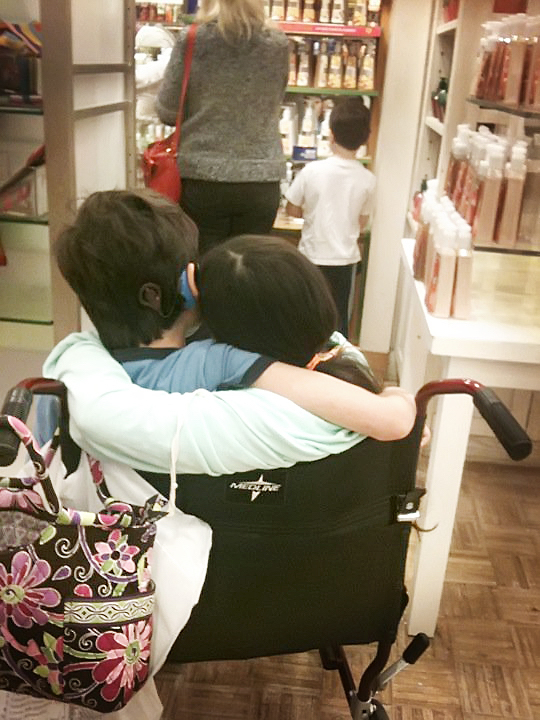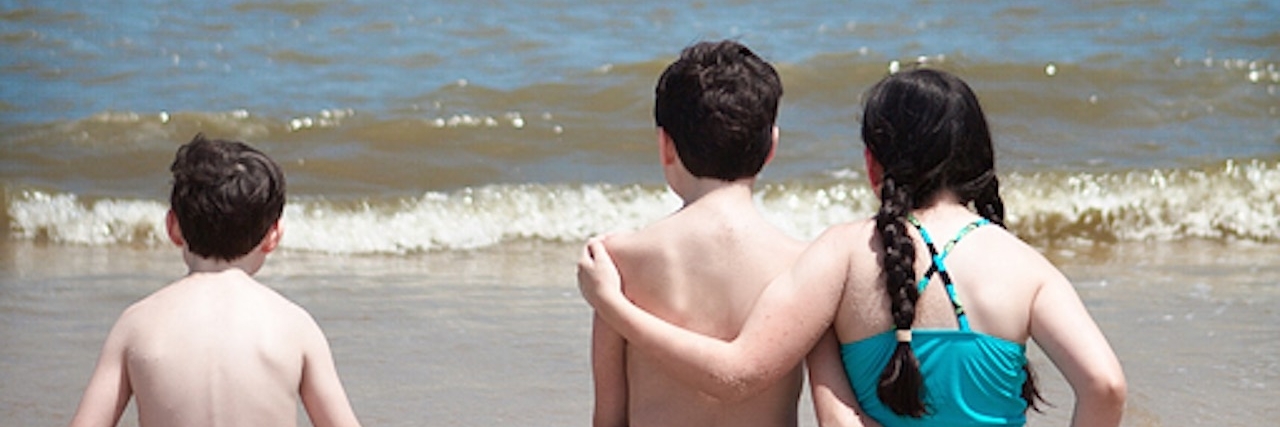How My Daughter Helped Me Through the 'Dark Days' With My Son's Illness

My daughter came into this world three years after my son was born. This was about 15 months after he developed the first of what would be a series of health declines in the years to come. (Having spent 15 years searching for answers, my son was finally diagnosed in late 2014 through the NIH Undiagnosed Diseases Program with Brown-Vialetto-Van Laere Syndrome (BVVL) — incredibly rare, with less than 100 people in the world diagnosed with the syndrome.) After the “year of pain and heartache,” grieving over my son’s sudden mystery disease, the birth of my daughter seemed like a beacon of hope in an otherwise dark and scary place. This amazing little creature, so endearing and precocious was exactly what my heart needed in order to heal. She became my partner, my best friend, filling in the piece of my soul that had been ripped out a year earlier when my first child started to deteriorate. I reveled in her growth and development, watching her flourish in ways my son never had the opportunity to do. I watched her closely for signs that she, too, might have the same disease, withholding a little bit of joy out of fear she may start fading away as my son had done. But as time went on and all of her milestones were reached, not only on time but often ahead of schedule, I began to realize she was going to be OK. And over the months and years that followed, I also came to realize that it was she and her luminous spirit that allowed me to get through those incredibly difficult days when I would sit in the dark, inconsolable, wondering “why my child?”
When she was very young, I would often stop and remind myself that “I” set the tone of the relationship with her. I told myself that I refuse to let the time and attention required to care for my disabled child affect the closeness that she and I were building. But as time passed, my older son began slipping away a little bit more. He could no longer walk, or hear, and he eventually lost the ability to use his arms and hands to feed himself or hold a marker. All of this deterioration came with no explanation and, what was worse, no way to stop it.
And with those setbacks, came less and less time to be there for my daughter. My days were consumed with research, doctors and questions — endless, unanswered questions and often hopelessness.
In 2004, my third child was born, another son — healthy, just as she was. Between caring for a newborn and a deteriorating 7-year-old, my sweet daughter seemed to get lost somewhere in the “chaos.” I took for granted her maturity and intelligence that belied her young age. She was a happy little girl who didn’t seem to mind sitting for hours waiting for her brother at therapies and doctor’s appointments. While other little girls were taking ballet lessons and having play dates, she sat obediently in the corner of stark, sterile hospital rooms, listening to doctors direct scientific questions about my son’s mysterious illness to a crowd of inquisitive medical students. As other children were at the playground or learning to ride a bike, she stood by stoically as her brother went through painful medical procedures. She intuitively knew her role was to exhibit patience and good spirits, no matter how hungry, bored or tired she might be. It was just how things were in her world.
Now that she is a teenager, I feel myself grieving for my daughter as well — mourning the years and time lost as I waged my son’s battles with health, doctors and schools. I regret the dance lessons and play dates and normal childhood she was denied. She was always seeking to make her own mark in the world.
And while she has missed a lot of life that others take for granted, she is stronger than other girls her age. She is mature and rational. She “gets it.” Her character is solid and her insight is highly developed. I watch her move through life with a sense of understanding about the people around her and where she fits in. The years spent as a silent observer have provided her with wisdom most of us will never achieve. Her empathy for others is profound. She has no admiration for those who attempt to ingratiate themselves and does not offer her respect without merit. And despite her sacrifices for the care and keeping of her older sibling, there has been little questioning of those things that have been forfeited. Sure, there is sometimes frustration over the choices we have to make as a family because of his disability. There are places we cannot go and things we cannot do. To say she doesn’t feel a little bit cheated would be a lie. Yet, still there is tremendous love and compassion, and something of a maternal nurturing toward him. It is a brother-sister relationship stronger and more caring than most. I realize now what an amazing gift she has been to him as well.
I have also come to realize that I never followed-through with the promises I made to her when she was born. I failed to deliver the time and attention I vowed to give her. I “did” define our relationship, but not in the way my heart intended. She was often brave when I could not be, sometimes strong when I was fragile. She was all the things I should have been, but couldn’t always be. I hope she knows I could not have made it without her. Her gentle spirit guided me during those dark days when I learned that life isn’t fair. When all is said and done, it was she who was truly the wind in my sails for so long, lifting me up when the gravity of my world tried to wrestle me down.
Soon she will be moving on and discovering her own place in the world. She will have an opportunity to define herself on her own terms without the constraints of a family that must function around the needs of one. And she will do great things that will change the world for the better. I know this, because in my world, she already has.
The Mighty is asking the following: What’s one thing people might not know about your experience with disability, disease or mental illness, and what would you say to teach them? Check out our Submit a Story page for more about our submission guidelines.

